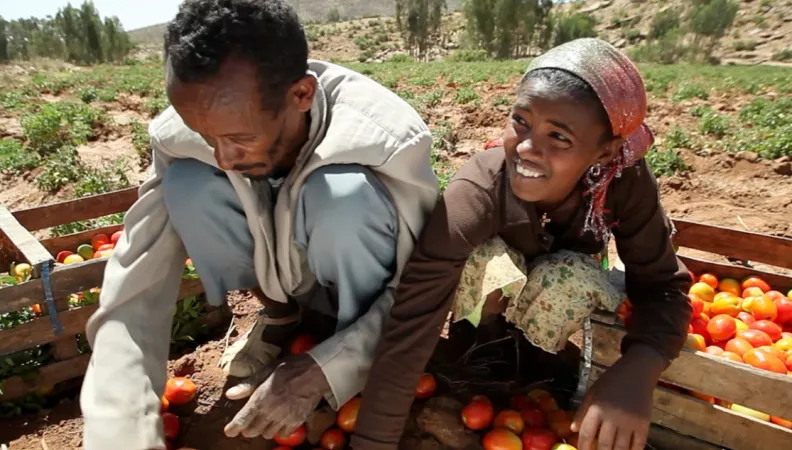Share the page
Evaluation of the Sectoral Intervention Framework on Food Security 2013-2016

-
Project start date
-
2015Status
Completed
-
Project end date
-
2016
-
Project duration
-
1 year and 2 months
-
Country and region
-
Location
-
Côte d'Ivoire, Sénégal
-
Research program
The evaluation of the sectoral intervention framework on food security in sub-Saharan Africa 2013-2016 sought to assess AFD’s strategy and portfolio in this sector and to draw lessons for planning the future intervention framework on food security.
Context
AFD’s sectoral intervention frameworks (SIFs) are reference documents that describe the way AFD proposes its interventions in a sector as well as how to put the political and strategic directives defined by AFD’s supervisory ministries into operation. The SIF on Food Security in Sub-Saharan Africa 2013-2016 had three aims :
- At the economic and social level: give impetus to sustained, rapid, inclusive and sustainable growth in all the agricultural sectors and in rural economies.
- At the ecological level: preserve a natural capital that is both diverse and fragile, from the field (through agricultural practices) to the whole region (through local governance and territorial development).
At the political level: make all actors, rural communities, local authorities, farmers and entrepreneurs participate in defining and implementing institutional innovations favorable to sustainable investments and the sharing of their profits.
See the SIF on "Food Security in Sub-Saharan Africa 2013-2016" (in French).
Goal
This evaluation of the SIF on food security sought to identify:
- the relevance of a selection of objectives of the SIF on food security in sub-Saharan Africa;
- whether these objectives were met;
- the usefulness of the SIF in terms of its ability to influence (AFD’s development strategy and outcomes, choice of financial instruments for the interventions, influence on AFD’s partners, communication);
- the quality of indicators and the mechanisms for monitoring project implementation, in order to assess the development outcomes of the interventions carried out as part of the SIF.
The results of this evaluation were intended to aid in preparing the following SIF. This evaluation was carried out by the consulting firm ADE.
Results
The food security SIF (FS SIF) met the challenges of food security in a relevant way. It was successful in identifying the areas in which AFD has comparative advantages. The SIF is used at the AFD headquarters, but only to a limited extent at the local-agency level. It is recognized as offering an integrated approach to food security and is used mainly prior to interventions by AFD personnel. The FS SIF is not used as a tool for management or for the monitoring and evaluation of interventions. The SIF seems effective overall, because the main expected outcomes of this framework were achieved (amounts of the financial commitments, geographic distribution of these commitments, financial tools used, etc.).
However, the outcomes are disappointing with regard to the objective of prevention and care of malnutrition, which was the object of few actual interventions. The evaluation mission was not able to identify impact from the FS SIF on the development outcomes (in particular because of the low number of project evaluations available) or in terms of influence on the other French and foreign stakeholders. Finally, the evaluation showed that the FS SIF did not offer a relevant monitoring mechanism making it possible to assess the outcomes of interventions implemented as part of the SIF.
Lessons learned
The evaluators proposed that the objective(s) of intervention frameworks, as well as the forms of implementation and follow-up, be clearly defined. They proposed three options for the future AFD intervention framework in food security, which in any event must not be limited to a particular geographical area. These are:
- Option 1: a “Food Security and Nutrition” SIF;
- Option 2: an “Agriculture and Rural Development” SIF and a “Food Security and Nutrition” CIF (cross-cutting intervention framework)
- Option 3: an “SDG2 End hunger, achieve food security and improved nutrition, and promote sustainable agriculture” SIF.
Finally, they recommend:
- clarifying the scope of inclusion of projects and the approach for accounting and reporting the number of projects contributing to food security;
- setting up a monitoring and evaluation framework coherent with indicators of outputs, outcomes and impacts defined based on an intervention logic;
- establishing a planning of evaluations focused specifically on the effects of food security interventions;
- lastly, starting up knowledge production and research work as part of the next SIF, to provide the means for participating in international discussions.
Click to see the synthesis of the evaluation report on this SIF.
Contact : Julien Calas, evaluation officer (calasj@afd.fr)
